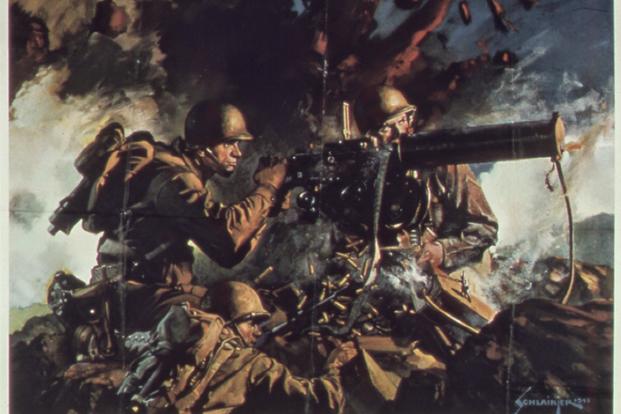The Nazis couldn’t stop them. Rivers and mountains couldn’t stop them. They passed beyond the Elbe, threw back counterattacks and rescued countless people living in brutal conditions in concentration camps. They were even saved by a cow. They were the soldiers of the Army’s 83rd Infantry “Thunderbolt” division, which celebrate the 100th anniversary of the division’s birth in September 2017.
1. Rag-Tag Circus
Not long after Gen. George S. Patton crossed the Rhine in 1944, Maj. Gen. Robert Macon, commanding officer of the 83rd, realized they weren’t keeping pace with the motorized units. He ordered his men to requisition anything that moved -- “no questions asked.”
And so the Rag-Tag Circus was formed: a collection of captured Wehrmacht jeeps, staff cars, ammunition trucks, Mark V and Tiger panzers, motorbikes, buses, fire engines and even a captured German ME-109. They even managed to find someone to fly it.
They were all painted an olive drab, marked with a U.S. star and put into service. The 83rd moved so fast, Nazi soldiers in villages were often caught unaware and were defeated.
2. Battlefield Bovines
One night during World War II, Lt. Leo Thomas Hury of Company L, 3rd Battalion, and his rifle company were doing reconnaissance in an area saturated with Nazi soldiers.
As they crept in the shadows, Hury heard heavy breathing on the other side of a hedgerow. He suspected it was a Nazi sentry that had fallen asleep and that they would easily capture him. As they moved through the opening, they made out a silhouette, sprang forward and captured … a cow. The cow was wounded with shrapnel but otherwise unharmed.
As it turns out, that fateful encounter with the cow delayed them just long enough to evade a nearby Nazi night patrol that would have easily overpowered and likely killed every soldier in their squad.
3. The Ultimate Citation
Ground was hard-won in the hedgerows. Hury and his men sustained heavy casualties and were pinned down by mortar fire. At one point, Hury was certain his platoon would be killed if they didn’t get out of a field, but his men were too dazed by the assault to move.
So he walked out the middle of the field -- and relieved himself. His platoon sergeant yelled to the men, “Look at the lieutenant pissing in the middle of the field. He’s not scared! Come on, get out of your foxholes and let’s get the hell out of this field.”
Later, Hury joked that he was “surprised he didn’t receive a medal” for urinating in a field and saving the lives of his men. He said, “I guess no one wanted to write a citation that would have to include this language:
Over and above the call of duty and with complete disregard
for the personal safety of an important part of his anatomy,
Lieutenant Hury, while under heavy mortar fire, urinated in an
open field in order to save the lives of the men in his platoon.”
4. Uncommon Valor
Medal of Honor recipient Sgt. Ralph G. Neppel served with the 83rd. He was leader of a machine-gun squad defending an approach to the village of Birgel, Germany, on Dec. 14, 1944, when an enemy tank, supported by 20 infantrymen, counterattacked.
He held his fire until the Nazis were within 100 yards and then raked the foot soldiers beside the tank, killing several of them.
The enemy armor continued to press forward and, at the point-blank range of 30 yards, fired a high-velocity shell into the American emplacement, wounding the entire squad.
Neppel, blown 10 yards from his gun, had one leg severed below the knee and suffered other wounds. Despite his injuries and the danger from the onrushing tank and infantry, he dragged himself back to his position on his elbows, remounted his gun and killed the remaining enemy riflemen.
Stripped of its infantry protection, the tank was forced to withdraw.
5. The Invincible Soldier
After the 329th Regiment arrived in Walternienburg, Sgt. Walter Arnold and his 10-man team positioned their 50-caliber machine gun inside a house. A German tank shot an armored piercing round at his position, hit a wall about three feet above Arnold and trapped him inside.
The next shell was a high explosive that detonated mere feet away, destroying his truck and 50-cal. Minus a slight concussion, he was unscathed.
In another harrowing incident, Arnold was near Rochefort, Belgium, when Germans rained down a hellish artillery barrage. He could see the shells exploding, as treetops fell and men all around him were hit and killed by the exploding fragments.
He survived without a scratch and moved on under the attack, giving what help he could to injured soldiers while sending one of his men down the road to get help.
Arnold was the recipient of five bronze stars for battles in Normandy, Northern France, the Ardennes, Rhineland and Central Europe.
The mighty Thunderbolts of the 83rd, the men of the “Rag-Tag Circus,” saw devastating things from the unnerving days of Normandy to the sure days east of the Elbe. They overcame them all with American ingenuity, Army grit, and a little olive drab paint.
Want to Know More About the Military?
Be sure to get the latest news about the U.S. military, as well as critical info about how to join and all the benefits of service. Subscribe to Military.com and receive customized updates delivered straight to your inbox.















